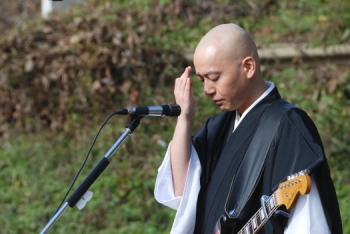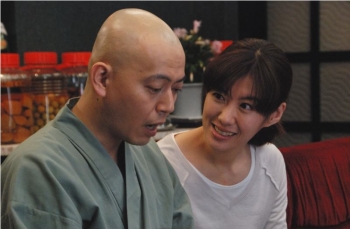The last time I listened to so-called hard rock was when I bought the most recent album from HIM (His Infernal Majesty), Screamworks. To the shock of my girlfriend and some close mates, I sometimes enjoy loud music, but Screamworks isn’t even that “hard.” And it is lounge-like compared to the music in “Abraxas,” which can be truly called hardcore punk rock. The film is surprisingly deep and I will not presume to cover all the themes latent in its subtext. But let us simply begin with the film’s gnostic title: “Abraxas,” the fusion of God and Satan, the divine with the infernal. This usually theism-associated term is combined with the ideal of the absurd in Zen to bring about a certain kind of existential courage. I hesitate to call it peace because J?nen’s peace is not the conventional Buddhist one. It is a courage that makes peace with the desire to liberate all beings – every Buddhist priest’s goal – with the desire to do what one really needs to do to grow into full personhood.
This movie was filmed in disaster-struck Fukushima. According to its director Kato, who was present for the screening in Amsterdam, many of the cast members and production team were from the prefecture. Our night at Amsterdam marked a haunting two-year anniversary since the film was completed.
The protagonist is J?nen, a neurotic and probably mentally ill priest under Genmune, the genial and open-minded abbot of his local temple. Sinking into depression from being unable to return to his punk rocker days, his pining and listlessness begins to affect everyone around him, from his wife to the suburbia community the temple watches over. One of these is J?nen’s old friend, the owner of a noodle store, and the latter’s teen son, who has own side story to tell. J?nen and Genmune agree that, after much negotiation, that the only way to solve J?nen’s existential crisis is to hold a punk rock concert. Due to various circumstances, J?nen decides to hold the live concert near the temple, attracting even more raised eyebrows. These are the basics to the story. The rest of the plot is somewhat sluggish, at points absurd, but it is a very deep accomplishment and its motifs and themes deserve to be digested slowly.
On a minor note: I have to admit that the protagonist’s Genmune’s wives are unexpectedly very important characters. Too used am I to seeing women as nothing more than silent partners or guilt-free sextoys in so many American films. But these two women drive the film in an elegant, understated way which I wish could have been given more recognition. The way J?nen’s wife supports him represents the very best of a human being touched by Buddhism. Yes, she is frustrated. There are several moments in the film where she very clearly wants to strangle J?nen. But despite his frequent flouting of her wishes, she isn’t simply a woman concerned with her self-image or the image of her family. She is interested in the best possible way to rehabilitate her partner, and this is evident by the end of the film, when she spurs on her husband’s peculiar but strangely hypnotic monologue, “Namu Abraxas.”
Then there is there peculiar, quirky character of Genmune’s young wife, who is extremely encouraging of J?nen’s ambitions. At times I wondered if she had a crush on the lucky fellow, but it is probably my narrow, Anglo-Chinese understanding of cinema tropes that blinds me to Japanese possibilities about a woman being – God forbid! – caring and concerned towards another man other than her husband without being shamed for any implied infidelity.
Some might see the film’s pace as sluggish, but no one should be expecting an actual performance where a monastic star rips off his shirt before a cheering audience (admittedly, that does happen here). What I am trying to say is that this movie is not supposed to be exciting in any conventional way, but in a totally musical and spiritual one. It is supposed to titillate the poetic and metaphorical imagination. As with most enjoyable movies, there are many worthwhile themes interwoven into the plot, from the noodle shop family and karaoke bars to crashing waves, motorcycles and the shrine’s elderly dog, Namu. Some reviews have tried to pick these themes and images apart, including comparing it with other slice-of-life films (both American and Japanese) with musical themes. But I will not attempt the same here. The film, including its relatively open happy ending, is ripe pickings for different interpretations, and at some points we see that J?nen’s situation is even worse than we thought (his medications, for example). But Abraxas, like all meaningful movies, is beyond what a mere review can describe about it. For this reason alone I hesitate to over-analyse it, and I can only do the most important thing a reviewer is paid to do: recommend or dissuade a reader from it. And I highly recommend that money be spent on this praiseworthy production.
When the film was over, I shook hands with Kato and asked if one of the main messages in the film was that one’s desires and the way of renunciation can be reconciled. Kato humbly replied that J?nen is simply a middle-aged man who does not know what to do with life, but as a monk must live as his situation permits. Behind my question was my own criticism of understandings about the movie: I am not as sympathetic as other reviewers of how J?nen resolves his plight. Of course, it might have been the only way to get rid of his unhealthy preoccupation. I remain agnostic about its merits and whether it was true to the calling of a priest, while Anglophone reviews return to the theme of finding beauty in imperfection, to appreciate the cracks in a teacup, and the fact that Genmune knows that J?nen cannot be a monk in the traditional sense. Of course, Western reviews of Buddhist movies enjoy the fact that Buddhists within those movies appreciate imperfection, while often forgetting that Buddhist doctrine teaches nothing less than to believe in perfection in the Buddha. But those fictional Buddhists are human. We all need to accept imperfection in our fellow others because this world is sa?s?ra. But Buddhism does teach perfectibility, and its vision is more obvious than what many in the West understand (or want to understand) it to be: sa?s?ra may be Nirv??a, but Nirv??a is deathless, utterly holy, and perfect. And sa?s?ra is only perfect when Nirv??a is realized.
Just because we are human and are forced to accept our limitations doesn’t mean we are to satisfy ourselves with them. With Buddhism a vision is offered of annihilating those imperfections and evolving into the full persons of Buddhas. And if some reviewers forget to recall this Mah?y?na doctrine as they watch Abraxas, then perhaps the movie’s message in its proper context remains incomplete.

















